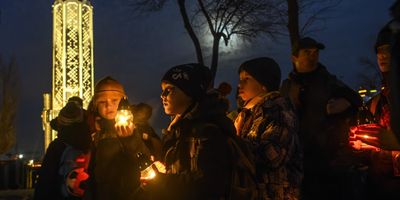Hard Numbers: Russian drones, Malagasy election, Ireland's clashes, China's illnesses, breakaway iceberg
75: Russia launched its biggest-ever drone attack on Kyiv on Saturday, firing 75 Iranian-made Shahed drones at the Ukrainian capital, and all but one were shot down. President Volodymyr Zelensky condemned the attack, noting that it came on the commemoration of the 1932-1933 Holodomor famine, engineered by Soviet dictator Joseph Stalin, which killed several million Ukrainians.
58.9: Madagascar’s incumbent President Andry Rajoelina is poised for a new term in office after garnering 58.9% of the vote in last week’s elections. Only 46% of voters cast a ballot after 10 of 12 rival parties refused to campaign and called for a boycott. They now refuse to recognize the results, which have to be formally validated by the country’s constitutional court.
34: Thirty-four people have been arrested in Dublin, Ireland, following clashes between right-wing protesters and police that saw widespread looting and rioting. The violence erupted after a man, who was falsely described as a foreign national, was taken into custody following last Thursday's stabbing of three schoolchildren outside a primary school.
13,000: Videos of Chinese hospitals overflowing with parents and children have circulated on social media. Beijing Children’s Hospital was admitting 7,000 patients daily as of late last week, and the largest pediatric hospital in Tianjin broke a record on Saturday, receiving more than 13,000 children. China told the World Health Organization the surge is due to the relaxing of COVID-19 restrictions and an increase in COVID-19, influenza, mycoplasma pneumoniae, and respiratory syncytial virus, not a novel virus.
1,500: One of the world’s largest icebergs is drifting beyond Antarctic waters after being grounded for more than three decades, according to the British Antarctic Survey. The iceberg is three times as large as New York City and over twice as big as Greater London, measuring around 1,500 square miles.